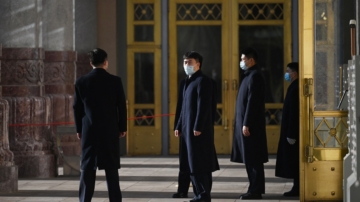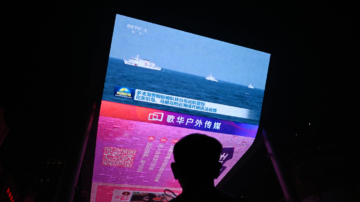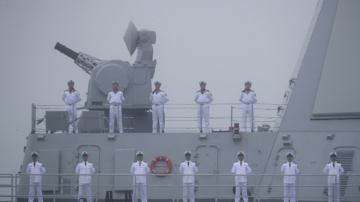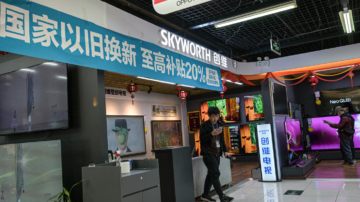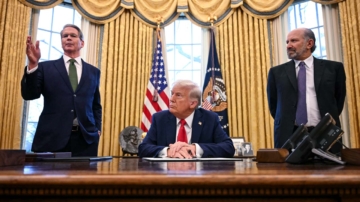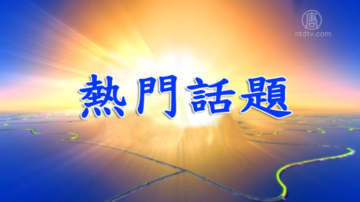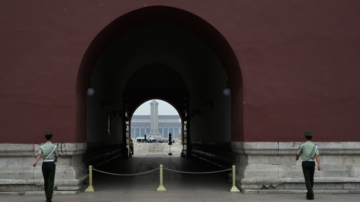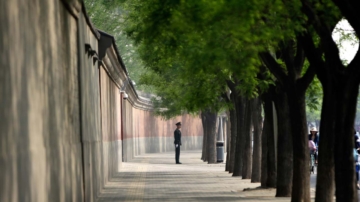【新唐人2014年09月19日讯】8月份,中国工业增长速度急剧下降,中共的经济政策再次走到了十字路口。大规模刺激很显然会导致通货膨胀剧增,但不采取刺激措施的话,经济又摇摇欲坠。专家指出,央行日前向5大银行再次注资5000亿人民币,正是中共当局进退维谷的反映,而且仍然无法解决中国经济面临的困境。
日前,中国银行业一名高管,向美国《华尔街日报》透露,中共央行近期向中国五大国有银行,注入了5000亿元流动资金,来应对国内比预期更糟糕的经济放缓局面。
这次注资,采用向银行提供3个月期低息贷款的形式,注资规模相当于把商业银行存款准备金率,下调了50个基点。
这位管理人士还称,虽然这一定向贷款,并不附加明确条件,但预计央行将引导银行,将信贷投向当局认为对经济很重要的领域。
美国南卡罗莱纳大学艾肯商学院教授谢田:“其实反映出来他们一种非常矛盾、左右为难的这样一种境地,显然他们又想刺激经济,但是又不敢刺激得过多,他们也知道通货膨胀的危险,不敢不刺激,也不敢大刺激,实际上还是处在面临经济危机的最紧迫的时刻。”
此前,中共公布了一系列令人失望的经济数据。8月份,规模以上工业增加值增长6.9%,创下自2008年12月以来的新低。此外,1-8月固定资产投资增速,比1-7月回落0.5个百分点,延续了近两年稳步下行的趋势。
而8月份的社会融资规模,比去年同期减少了6267亿元﹔代表居民消费价格指数的CPI涨幅,也创下近4个月以来的新低﹔与此同时,代表全面经济指标的PMI环比下降了0.6个百分点,而非制造业新订单指数也下跌到50,创下2009年5月以来新低,进口同比下降了2.4%。
9月18号,中共统计局发布了8月份城市住宅销售价格统计数据,以及新建商品住宅价格变动情况,70个大中城市中,价格下降的城市达到68个。
尽管开发商大幅降价、地方政府放松限购政策,但没有销售出去的住宅地产供应量,还在继续增加,触及记录最高水平。
面对目前疲弱的经济形势,降低利息和降低基准利率的呼声,再一次响起。但中共央行的官员们却一直表示,如果实施降息等力度更大的宽松政策,可能会导致信贷氾滥,恶化中国的债务问题,使经济面临更大风险。
而美国摩根士丹利(Morgan Stanley)的经济学家认为,目前这种通过央行印制钞票注资的刺激,控制权掌握在央行手里,是在选择有条件的放松举措,来抵制要求下调利率,或者全面下调银行存款准备金率的压力。
渣打银行(Standard Chartered)经济学家李炜指出,如果决策者将高债务水平的问题,简单归咎于之前下调存款准备金率和利率的行动,是不公平的。因为这当中存在国家对银行业的垄断、缺乏利率市场化等诸多问题。 这次央行注资5000亿,不太可能提振市场人气。
花旗集团(Citigroup)经济学家沈明高、丁爽则认为,在降低融资成本方面,大范围下调政策利率,比含蓄地下调存款准备金率,更加透明和有效。
中国金融智库研究员巩胜利:“它这个是临时手段,不是解决问题的办法。简单的说,就是中国经济的运行成本,依然是居高不下,美元、欧元、日元几乎都是零利率的水平,而中国的利率是全球,特别是20个大国来讲,可能是最高的,它的基准利率是6.2%。”
中国金融智库研究员巩胜利说,中国的利率也不像其他国家一样稳定。据他统计,金融海啸以来,中国的利率调整过40多次。
巩胜利还指出,中国经济运行成本高,还体现在政府构架方面,其他国家不会超过4级构架,而中国有7级政府构架,尤其党政同时运行的体制,给中国经济带来了巨大负担。
采访编辑/刘惠 后制/舒灿
CCP Central Bank Pumps Money,
The Authorities in Dilemma
The month of August saw a sharp decline
in China’s industrial growth rate.
Now China's economy is again at a crossroads.
Massive stimulus will likely lead to a surge in inflation,
but without it the economy will crumble.
Experts say that mainland China's Central Bank's recent
pumping of 500 billion yuan ($81 billion) into China's five
major banks reflects the dilemma Chinese authorities face.
However, it cannot solve the issues the economy is facing.
A Chinese banking executive has told the Wall Street Journal
that the Chinese Communist Party (CCP)'s central bank recent
500 billion yuan injection of liquidity to five state-owned banks,
to deal with worse-than-expected domestic economic slowdown.
The capital injection was provided in the form of
three monthly low-interest loans,
with a scale equivalent to 50 basis points down
for deposit reserve ratio of commercial banks.
The executive also said although the fixed loans
don't have specific conditions, the central bank will
guide the banks to loan the money to areas
considered by the authorities as very important to the economy.
Frank Xie, business professor at University of South Carolina
Aiken: "It reflects their dilemma.
Obviously they want to stimulate the economy,
but they dare not do too much.
They also know the danger of inflation.
They dare not just do nothing,
but also dare not to do too much.
They are in fact still at the most urgent moment
facing the economic crisis."
Earlier this year, the CCP released economic data
showing a series of disappointing results.
In August, above-scale industrial added value
increased 6.9 percent, the lowest since December 2008.
In addition, the fixed asset investment growth rate
from January to August was down 0.5 percent
compared to the growth rate from January to July,
continuing the steady downward trend on the past two years.
The scale of social financing in August was 626.7 billion yuan
($102 billion) lower than the same period last year;
increase of consumer price index also hit the newest low
in four months; meanwhile, PMI comprehensive economic
indicators fell 0.6 percent, non-manufacturing
new orders index fell to 50, a record low since May 2009
and imports fell by 2.4 percent year over year.
On Sept. 18, the CCP's Bureau of Statistics released the urban
residential sales price statistics and new residential housing
price changes for August.
It shows that prices declined in 68 of 70 cities.
Although developers are slashing prices and
local governments are relaxing purchase restriction policy,
the supply of houses and residential real estate
continue to increase, reaching a record high.
Faced with the current weak economy, there have again been
calls for lower interest rates and a benchmark interest rate.
The CCP's central bank leadership has been saying that
greater efforts to cut interest rates may result in
proliferation of credit, deterioration of China's debt problem
and greater risks to the economy.
U.S.-based financial services corporation Morgan Stanley
economists say that the central bank's capital injection stimulus
is a conditional measure controlled by the bank.
It's done to resist the pressure of cutting interest rates or
overall decreasing bank deposit reserve ratio.
Standard Chartered Bank economist Li Wei says it's unfair
if policy makers simply blame the issue of
high debt on bank deposit reserve ratios and interest rates.
There are many problems such as monopoly of the banking
sector, lack of market interest rates and many other problems.
The 500 billion yuan from the central bank
is unlikely to boost the market.
Citigroup economists Shen Minggao and Ding Shuang say
a wide range of rate cuts is more transparent and effective
than lowering the deposit reserve ratio
in terms of the lower financing costs.
Gong Shengli, Chinese financial think-tank researcher:
"This is a temporary fix, not a solution to the problem.
To put it simply, the operating costs of China's economy
is still high.
With the interest of dollar, euro and yen almost at zero,
China’s benchmark interest rate is 6.2%,
possibly the highest in the world,
especially among the 20 big countries."
Gong says that China's interest rates
are not as stable as other countries.
Based on his calculations, China's interest rate
has been adjusted over 40 times since the financial crisis.
Gong also says that the high operating costs of China’s
economy are also reflected in the government structure.
The governmental structure of most other countries include
no more than four layers, but China's has seven layers.
The simultaneous operation of both the political system
and the Party system has brought
huge burdens to China’s economy.
Interview & Edit/LiuHui Post-Production/ShuCan
日前,中国银行业一名高管,向美国《华尔街日报》透露,中共央行近期向中国五大国有银行,注入了5000亿元流动资金,来应对国内比预期更糟糕的经济放缓局面。
这次注资,采用向银行提供3个月期低息贷款的形式,注资规模相当于把商业银行存款准备金率,下调了50个基点。
这位管理人士还称,虽然这一定向贷款,并不附加明确条件,但预计央行将引导银行,将信贷投向当局认为对经济很重要的领域。
美国南卡罗莱纳大学艾肯商学院教授谢田:“其实反映出来他们一种非常矛盾、左右为难的这样一种境地,显然他们又想刺激经济,但是又不敢刺激得过多,他们也知道通货膨胀的危险,不敢不刺激,也不敢大刺激,实际上还是处在面临经济危机的最紧迫的时刻。”
此前,中共公布了一系列令人失望的经济数据。8月份,规模以上工业增加值增长6.9%,创下自2008年12月以来的新低。此外,1-8月固定资产投资增速,比1-7月回落0.5个百分点,延续了近两年稳步下行的趋势。
而8月份的社会融资规模,比去年同期减少了6267亿元﹔代表居民消费价格指数的CPI涨幅,也创下近4个月以来的新低﹔与此同时,代表全面经济指标的PMI环比下降了0.6个百分点,而非制造业新订单指数也下跌到50,创下2009年5月以来新低,进口同比下降了2.4%。
9月18号,中共统计局发布了8月份城市住宅销售价格统计数据,以及新建商品住宅价格变动情况,70个大中城市中,价格下降的城市达到68个。
尽管开发商大幅降价、地方政府放松限购政策,但没有销售出去的住宅地产供应量,还在继续增加,触及记录最高水平。
面对目前疲弱的经济形势,降低利息和降低基准利率的呼声,再一次响起。但中共央行的官员们却一直表示,如果实施降息等力度更大的宽松政策,可能会导致信贷氾滥,恶化中国的债务问题,使经济面临更大风险。
而美国摩根士丹利(Morgan Stanley)的经济学家认为,目前这种通过央行印制钞票注资的刺激,控制权掌握在央行手里,是在选择有条件的放松举措,来抵制要求下调利率,或者全面下调银行存款准备金率的压力。
渣打银行(Standard Chartered)经济学家李炜指出,如果决策者将高债务水平的问题,简单归咎于之前下调存款准备金率和利率的行动,是不公平的。因为这当中存在国家对银行业的垄断、缺乏利率市场化等诸多问题。 这次央行注资5000亿,不太可能提振市场人气。
花旗集团(Citigroup)经济学家沈明高、丁爽则认为,在降低融资成本方面,大范围下调政策利率,比含蓄地下调存款准备金率,更加透明和有效。
中国金融智库研究员巩胜利:“它这个是临时手段,不是解决问题的办法。简单的说,就是中国经济的运行成本,依然是居高不下,美元、欧元、日元几乎都是零利率的水平,而中国的利率是全球,特别是20个大国来讲,可能是最高的,它的基准利率是6.2%。”
中国金融智库研究员巩胜利说,中国的利率也不像其他国家一样稳定。据他统计,金融海啸以来,中国的利率调整过40多次。
巩胜利还指出,中国经济运行成本高,还体现在政府构架方面,其他国家不会超过4级构架,而中国有7级政府构架,尤其党政同时运行的体制,给中国经济带来了巨大负担。
采访编辑/刘惠 后制/舒灿
CCP Central Bank Pumps Money,
The Authorities in Dilemma
The month of August saw a sharp decline
in China’s industrial growth rate.
Now China's economy is again at a crossroads.
Massive stimulus will likely lead to a surge in inflation,
but without it the economy will crumble.
Experts say that mainland China's Central Bank's recent
pumping of 500 billion yuan ($81 billion) into China's five
major banks reflects the dilemma Chinese authorities face.
However, it cannot solve the issues the economy is facing.
A Chinese banking executive has told the Wall Street Journal
that the Chinese Communist Party (CCP)'s central bank recent
500 billion yuan injection of liquidity to five state-owned banks,
to deal with worse-than-expected domestic economic slowdown.
The capital injection was provided in the form of
three monthly low-interest loans,
with a scale equivalent to 50 basis points down
for deposit reserve ratio of commercial banks.
The executive also said although the fixed loans
don't have specific conditions, the central bank will
guide the banks to loan the money to areas
considered by the authorities as very important to the economy.
Frank Xie, business professor at University of South Carolina
Aiken: "It reflects their dilemma.
Obviously they want to stimulate the economy,
but they dare not do too much.
They also know the danger of inflation.
They dare not just do nothing,
but also dare not to do too much.
They are in fact still at the most urgent moment
facing the economic crisis."
Earlier this year, the CCP released economic data
showing a series of disappointing results.
In August, above-scale industrial added value
increased 6.9 percent, the lowest since December 2008.
In addition, the fixed asset investment growth rate
from January to August was down 0.5 percent
compared to the growth rate from January to July,
continuing the steady downward trend on the past two years.
The scale of social financing in August was 626.7 billion yuan
($102 billion) lower than the same period last year;
increase of consumer price index also hit the newest low
in four months; meanwhile, PMI comprehensive economic
indicators fell 0.6 percent, non-manufacturing
new orders index fell to 50, a record low since May 2009
and imports fell by 2.4 percent year over year.
On Sept. 18, the CCP's Bureau of Statistics released the urban
residential sales price statistics and new residential housing
price changes for August.
It shows that prices declined in 68 of 70 cities.
Although developers are slashing prices and
local governments are relaxing purchase restriction policy,
the supply of houses and residential real estate
continue to increase, reaching a record high.
Faced with the current weak economy, there have again been
calls for lower interest rates and a benchmark interest rate.
The CCP's central bank leadership has been saying that
greater efforts to cut interest rates may result in
proliferation of credit, deterioration of China's debt problem
and greater risks to the economy.
U.S.-based financial services corporation Morgan Stanley
economists say that the central bank's capital injection stimulus
is a conditional measure controlled by the bank.
It's done to resist the pressure of cutting interest rates or
overall decreasing bank deposit reserve ratio.
Standard Chartered Bank economist Li Wei says it's unfair
if policy makers simply blame the issue of
high debt on bank deposit reserve ratios and interest rates.
There are many problems such as monopoly of the banking
sector, lack of market interest rates and many other problems.
The 500 billion yuan from the central bank
is unlikely to boost the market.
Citigroup economists Shen Minggao and Ding Shuang say
a wide range of rate cuts is more transparent and effective
than lowering the deposit reserve ratio
in terms of the lower financing costs.
Gong Shengli, Chinese financial think-tank researcher:
"This is a temporary fix, not a solution to the problem.
To put it simply, the operating costs of China's economy
is still high.
With the interest of dollar, euro and yen almost at zero,
China’s benchmark interest rate is 6.2%,
possibly the highest in the world,
especially among the 20 big countries."
Gong says that China's interest rates
are not as stable as other countries.
Based on his calculations, China's interest rate
has been adjusted over 40 times since the financial crisis.
Gong also says that the high operating costs of China’s
economy are also reflected in the government structure.
The governmental structure of most other countries include
no more than four layers, but China's has seven layers.
The simultaneous operation of both the political system
and the Party system has brought
huge burdens to China’s economy.
Interview & Edit/LiuHui Post-Production/ShuCan

